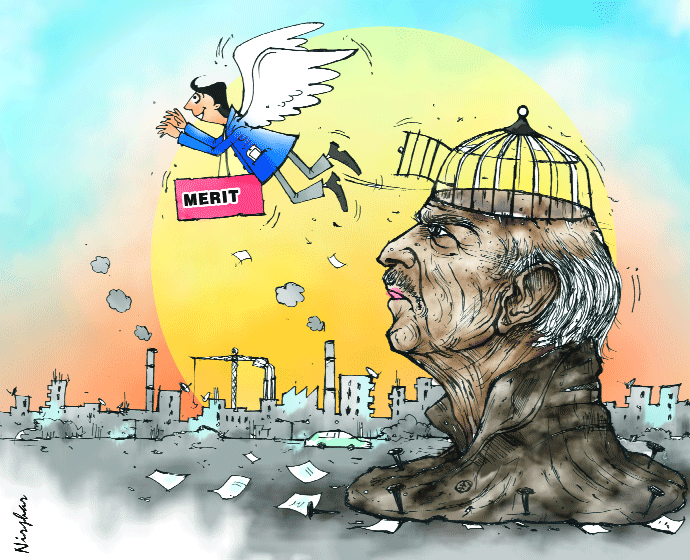Sachin Tendulkar said: “I just keep it simple. Watch the ball and play it on merit.” Merit is the word
Invoking seniority is the lazy way out to making key appointments. It’s also a good way to cover one’s back. And it maintains status quo insofar as shunning intrepidity and creativity is concerned. The use of ‘seniority’ criterion is a wonderful means to accumulating deadwood too. It’s the bane of a nation that pushes for progress, that seeks novel ways to forge ahead, that hopes to redefine dynamism coupled with rewards for performers.
But seniority has its purpose, in a limited sense. When the ‘all things being equal’ situation kicks in, seniority is a good polestar to be guided by. But ‘all things being equal’ is a euphemism for an ideal circumstance. And ideal is hard to come by these days. In any case, all things are never equal. Even if they are, for argument’s sake, in terms of strengths and weaknesses of the candidates in question, there is the issue of the ‘situation at hand’. Who among the probables, all equal in all respects, can fit into that situationIJ The moment this consideration looms, seniority takes a backseat and merit of the moment dominates. Supersession is not a dirty word.
This has been happening all around — in the world and in India increasingly. In politics, in business, in sports, in films, in journalism, and in any field of speciality. A veteran cricketer who has represented his nation for over a decade, can no longer depend on his seniority to be part of the national side; he must perform or perish. The senior manager who has seen his company grow into a multi-billion dollar enterprise straddling continents, from a single-room entity, cannot by virtue of seniority lay claim to the chief executive’s post. A politician who has devoted a lifetime to public service cannot by right demand the pole position. A young and promising journalist cannot be put down because he/she is not senior enough to assume responsible duties. The merited who have demonstrated their credentials, occupy the centre-stage.
There is no shame here to the concept of seniority. Respect and regard for seniors is not under a threat, nor is there a compromise of the unethical kind. Seniors have a place under the sun, for the sun shines for all. But their merit was for a different day in a different context. Today needs a new merit, and if a younger person who does not figure in the hierarchy list has that merit, then that person moves up, toppling those above in the pecking order.
The problem is not so much of seniority (even if suited for a different day and age) plus merit ; it’s of seniority without merit. For decades, Government servants have moved up the ladder in a pre-determined fashion guided by the seniority principle alone. They did not have to perform, let alone excel; there was no need to exert because non-performance was not a hindrance to promotion. Promotion was the rule, even if unwritten. If somebody dared to challenge it, the person was in trouble. lack of merit has been a non-issue for long, and those who question it land up in the courts for ‘deviating’ from a long-held convention. Additionally, one must always be careful to take into consideration the caste and community profile of the person being challenged for lack of merit!
On the other hand, the meritorious in the Government department, who know that the rules of promotion based on seniority are weighed against them, have little incentive to perform. They either quit or join the list of non-performers. In both cases, the department, the system of governance and the nation are the losers. One reason why the private sector has flourished while the public enterprises have lagged behind over the decades is that the meritorious in the former get the desired space but are shunted out in the latter. Things have fortunately begun changing, and lateral entrants into Government service from the ‘outside’ are expected to boost the trend of merit and dilute the ‘seniority’ hegemony.
It’s not as if wisdom has dawned only today. Nowhere in the Constitution of India or even in Government rules is the rule of seniority over everything else (including merit) enshrined or upheld. Yes, ‘merit with due regard to seniority’ has been the mantra — but never implemented in spirit.
In present times, with nearly 65 per cent of the country’s population being 35 years of age or less, ‘promotion based on seniority without merit’ is an unacceptable proposition. Even hallowed institutions such as the courts are expected to understand it. Retired Supreme Court judge Markandey Katju had, two years ago, suggested that the Union Government must junk the ‘senior-most’ criterion in naming a new Chief Justice of India. He said there was “no constitutional provision” or “statutory rule” to follow the seniority principle blindly. This applies to many Government departments.
Cricket legend Sachin Tendulkar once said: “I just keep it simple. Watch the ball and play it on merit.” Similarly, our policymakers must watch the situation and pick candidates on merit.


























